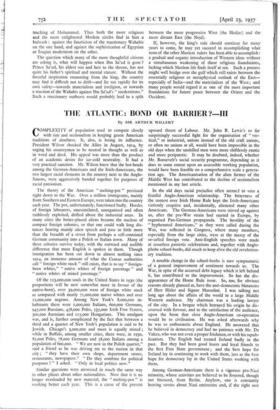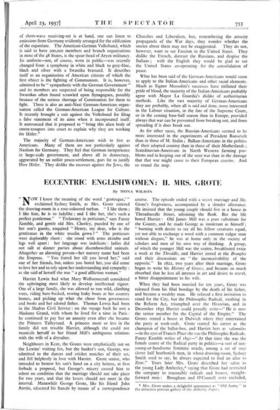THE ATLANTIC : BOND OR BARRIER ?
By SIR ARTHUR WILLERT
The theory of the American " melting-pot " persisted right down to the War. Over a million immigrants, mainly from Southern and Eastern Europe, were taken into the country each year. The pot, unfortunately, functioned badly. Hordes of foreign labourers, unassimilated, unorganised and often ruthlessly exploited, drifted about the industrial areas. In many cities the better-placed aliens became the nucleus of compact foreign colonies, so that one could walk long dis- tances hearing mainly alien speech and pass in little more than the breadth of a street from perhaps a self-contained German community into a Polish or Italian town. Many of these colonies survive today, with the outward and audible difference that more English is spoken in them. Though immigration has been cut down to almost nothing since 1914, an immense amount of what the Census authorities call " foreign white stock " still exists, that is to say " foreign- born whites," " native whites of foreign parentage " and " native whites of mixed parentage."
Of the 123,000,000 souls in the United States in 193o (the proportions will be now somewhat more in favour of the native-born), over 39,000,000 were of foreign white stock as compared with nearly 71,000,000 native whites and over 12,000,000 negroes. Among New York's 8,000,000 in- habitants there were t,000,000 Italians, 600,000 Germans, 945,000 Russians, 458,000 Poles, 535,000 Irish Free Staters, 300,000 Austrians and 115,000 Hungarians. This amalgam was, and is, further complicated by the fact that between a third and a quarter of New York's population is said to be Jewish. Chicago's 3,000,000 and more is equally mixed ; while in Buffalo, among smaller cities, there were, in 193o, 85,000 Poles, 78,000 Germans and 58,000 Italians among a population of 600,000. " We are now in the Polish quarter," said a friend as he was driving me to the station in that city ; " they have their own shops, department stores; restaurants, newspapers." " Do they combine for political purposes ? " I asked. " Only in local politics now."
Similar questions were answered in much the same way in other places about other nationalities. Now that it is no longer overloaded by new material, the " melting-pot " is working better each year. This is a cause of the present upward thrust of Labour. Mr. John R. Lewis's so far surprisingly successful fight for the organisation of " ver- tical," or industrial, unions instead of the old craft unions, or often no unions at all, would have been impossible in the old days when the unskilled men were more shiftlessly exotic and more peripatetic. It may be doubted, indeed, whether Mr. Roosevelt's social security programme, depending as it does to some extent upon an accessible working population, would have been feasible on a comprehensive scale a genera- tion ago. The Americanisation of the alien farmer of the Middle West has contributed to the decline of sectionalism mentioned in my last article.
In the old days racial prejudice often seemed to veto a fruitful Anglo-American relationship. The bitterness of the contest over Irish Home Rule kept the Irish-Americans violently eruptive and, incidentally, alienated many other Americans. The German-Americans were stirred up against us, after the pre-War strain had started in Europe, by organised Pan-German propaganda. The hostility of the " hyphenated Americans," as they were called during the War, was reflected in Congress, where many members, especially from the large cities, were at the mercy of the so-called foreign vote. Anti-English speeches were made at countless patriotic celebrations and, together with Anglo- phobe school-books, did much to keep alive the old revolution- ary tradition.
A notable change in the school-books is now symptomatic of a general improvement of sentiment towards us. The War, in spite of the accursed debt legacy which it left behind it, has contributed to the improvement. So has the dis- appearance of the Home Rule issue. So, too, for obvious' reasons already glanced at, have the anti-democratic blatancies of Herr Hitler and Signor Mussolini. I was talking not long ago about the affairs of the world to a large Middle Western audience. My chairman was a leading lawyer of the city. In a brogue which betrayed his origin he dis- coursed with fervour, and to the satisfaction of the audience, upon the boon that close Anglo-American co-operation would be to civilisation. He was asked afterwards why he was so enthusiastic about England. He answered that he believed in democracy and had no patience with Mr. De Valera, who was not even a proper Irishman, or with his repub- licanism. The English had treated Ireland badly in the past. But they had been good losers and loyal friends to the first Free State government ; and the best hope for Ireland lay in continuing to work with them, just as the best hope for democracy lay in the United States working with them.
Among German-Americans there is a vigorous pro-Nazi minority, whose activities are believed to be fostered, though not financed, from Berlin. Anyhow, one is constantly hearing stories about Nazi emissaries and, if the right sort of short-wave receiving-set is at hand, one can listen to emissions from Germany evidently arranged for the edification of the expatriate. The American-German Volksbund, which is said to have 200,000 members and branch organisations in most of the 48 States, is the spear-head of Aryan militancy. Its uniform—not, of course, worn in public—was recently changed from a symphony in white and black to grey-blue, black and silver with a Swastika brassard. It describes itself as an organisation of American citizens of which the first object is the fighting of Communism. It is, however, admitted to be " sympathetic with the German Government " and its members are suspected of being responsible for the Swastikas often found scrawled upon Synagogues, possibly because of the serious shortage of Communists for them to fight. There is also an anti-Nazi German-American organ- isation called the German-American League for Culture. It recently brought 'a suit against the Volksbund for filing a false statement of its aims when it incorporated itself. It announced that it proposed to " bring this alien body of storm-troopers into court to explain why they are working for Hitler."
The majority of German-Americans wish to live as Americans. Many of them are not particularly against Naziism for Germany. They feel that German inexperience in large-scale government, and above all in democracy, aggravated by an unfair peace-settlement, goes far to justify Herr Hitler. They dislike the excesses against the Jews, the Churches and Liberalism, but, remembering the atrocity propaganda of the War days, they wonder whether the stories about them may not be exaggerated. They do not, however, want to see Fascism in the United States. They dislike the French, distrust the Russians, and despise the Italians ; with the English they would be glad to see the United States co-operating for the consolidation of peace.
What has been said of the German-Americans would seem to apply to the Italian-Americans and other racial elements. Much as Signor Mussolini's successes have titillated their pride of blood, the majority of the Italian-Americans probably agree with Mayor La Guardia's dislike of authoritarian methods. Like the vast majority of German-Americans they are probably, when all is said and done, more interested in the Labour situation, in the fate of the Supreme Court, or in the coming base-ball season than in Europe, provided always that war can be prevented from breaking out, and from spreading if it does break out.
As for other races, the Russian-Americans seemed to be more interested in the experiments of President Roosevelt than in those of M. Stalin ; Balkan-Americans in the politics of their adopted country than in those of their Motherlands ; Scandinavian-Americans in North Western farming pro- blems and in keeping out of the next war than in the damage that that war might cause to their European cousins. And so round the map.











































 Previous page
Previous page